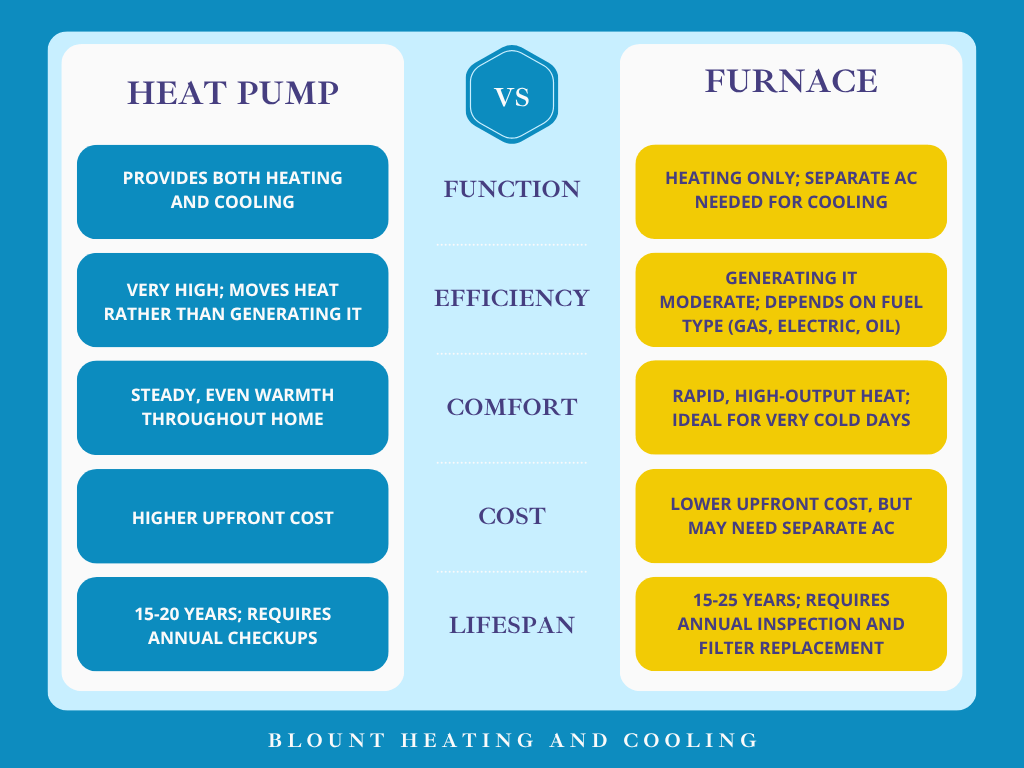×
Is My Heat Pump Supposed to Run All the Time?
If you live in Athens, GA and have a heat pump, you may have asked yourself this question at some point, especially during colder or hotter days....
Choosing the right heating system for your Athens, GA home can feel overwhelming. With options like traditional furnaces and modern heat pumps, it’s important to understand the differences, costs, efficiency, and comfort each system provides. The right choice can save you money, improve energy efficiency, and ensure your home remains comfortable year-round.
A heat pump is a versatile HVAC system that transfers heat instead of generating it. During the winter, it extracts heat from the outside air, ground, or water and moves it indoors to warm your home. In the summer, it reverses the process, removing heat from inside your home and releasing it outdoors, effectively functioning as an energy-efficient air conditioner.
Key features of heat pumps:
A furnace generates heat using fuel sources such as natural gas, propane, oil, or electricity. The generated heat is then distributed throughout the home via ductwork. Furnaces are known for their ability to provide high-output heat quickly, making them reliable even on the coldest winter days. Unlike heat pumps, furnaces only provide heating, which means a separate air conditioning system is necessary for summer cooling.
Key features of furnaces:
Heat pumps operate on a refrigeration cycle:
Modern heat pumps are highly efficient and can operate effectively even in sub-freezing temperatures. Their efficiency is measured using SEER (Seasonal Energy Efficiency Ratio) for cooling and HSPF (Heating Seasonal Performance Factor) for heating.
Furnaces generate heat through combustion or electric resistance:
Furnaces are rated by AFUE (Annual Fuel Utilization Efficiency). Modern gas furnaces can reach AFUE ratings of up to 98%, meaning nearly all the energy from the fuel is converted to heat. Furnaces deliver high-output heat, ideal for extreme cold, but only provide heating, so air conditioning is needed for summer.
Heat pumps are generally the greener option, especially in moderate climates like Athens.
Lifespan:
Proper maintenance ensures either system operates efficiently for years.
Factors to consider: home size, layout, energy goals, and budget. Some homeowners choose a hybrid solution, pairing a heat pump with a furnace for maximum efficiency and rapid heating on cold days.

Choose a Heat Pump if:
Choose a Furnace if:
Taking advantage of these programs can reduce upfront costs while maximizing long-term savings.
Q: Can a heat pump keep my home warm in freezing temperatures?
A: Yes! Modern heat pumps, including cold-climate models, efficiently heat homes even in sub-freezing temperatures.
Q: Are heat pumps noisy compared to furnaces?
A: Modern heat pumps are quiet, often quieter than traditional AC systems. Furnaces are generally quiet but may have noticeable airflow sounds.
Q: How long do heat pumps and furnaces last?
A: Heat pumps: 15-20 years (geothermal up to 25 years). Gas furnaces: 15-20 years. Electric furnaces: 20-25 years.
Q: Which system saves more on energy bills?
A: In moderate climates like Athens, heat pumps typically save more due to their efficiency and dual functionality.
Q: Can I switch from a furnace to a heat pump?
A: Yes. Many homeowners replace older furnaces with modern heat pumps for energy efficiency and year-round comfort.
Selecting the right heating system is crucial, but proper installation and service are equally important. At Blount Heating and Cooling, we specialize in:
Our team ensures your system provides reliable, year-round comfort while helping you save on energy bills.
Choosing between a heat pump and a furnace comes down to your home, climate, comfort preferences, and energy goals. Heat pumps are energy-efficient, environmentally friendly, and provide year-round comfort in moderate climates like Athens. Furnaces in Athens deliver rapid heat and perform reliably during extremely cold weather. Hybrid systems can combine the benefits of both.
For expert guidance, heating installation, or preventative maintenance, Blount Heating and Cooling is here to help Athens homeowners select the perfect heating system to stay comfortable in every season.
If you live in Athens, GA and have a heat pump, you may have asked yourself this question at some point, especially during colder or hotter days....
If you are a homeowner in Athens, GA, understanding what type of heating system you have is more important than you might think. Many homeowners are...
Cold spots in your home aren’t just annoying — they’re a sign something isn’t working the way it should. One minute you're warm and comfortable in...
If you’re a homeowner in Athens, GA, investing in a heat pump is a smart way to keep your home comfortable year-round while saving on energy costs....
If you’re a homeowner in Athens, GA, looking to improve your home’s comfort while saving on energy bills, you may have heard about heat pumps. But...
Choosing the right furnace for your home is an important decision. If you live in Athens, GA, you might be wondering whether a gas furnace or an...
If you’ve ever turned on your thermostat and heard your furnace start up but felt only cold air coming through the vents, you’re not alone. Many...
Heating your home during the cooler months should not come with high energy bills or wasted power. Whether you rely on a traditional furnace, heat...
When cold weather hits, homeowners in Athens, GA often ask the same question: should you leave your heat on all day, or turn it off when you leave...
When the air in Athens, GA turns crisp and Sanford Stadium lights up for another Georgia Bulldogs football game, one thing is certain: fall has...